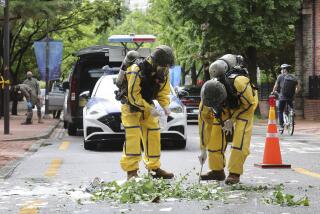In the North, No Nights on the Town
- Share via
PYONGYANG, North Korea — A mere 40 minutes of Internet access will set a journalist back more than $1,000.
Visitors are under orders not to leave their hotel except in the company of an assigned “minder.” And forget about trying to use cellular or satellite phones--they are confiscated at the airport.
Welcome to North Korea, which opened its doors a crack Sunday to about 60 international reporters covering the visit of Secretary of State Madeleine Albright to one of the most isolationist nations on Earth. The journalists, who arrived on a shabby North Korean charter plane from Beijing about 12 hours ahead of her, got a rare peek at this capital city Sunday afternoon as they began a three-day journey with Albright.
Often called the hermit kingdom, North Korea grants visas to U.S. reporters only slightly more often than the Mets and the Yankees square off in a Subway Series. A quick view of Pyongyang, the capital, just before dusk revealed wide boulevards virtually empty of cars and litter, numerous hulking monuments and neon signs dedicated to the late patriarch Kim Il Sung, and people dressed in sweaters and jackets to keep warm on a brisk fall afternoon.
On the outskirts of town, several apartment buildings built from concrete blocks appeared to be without power. But in the heart of the city, tall apartment houses were alight, albeit dimly, as if the bulbs had all maxed out at 40 watts.
Pictures of “Great Leader” Kim and his son, “Dear Leader” Kim Jong Il, could be seen hanging on the walls inside many apartments. By 9 p.m., the downtown streets surrounding the Stalinist-style, twin-towered, 40-story hotel that houses most international guests were eerily deserted, with the rattle of aging streetcars among the few sounds interrupting the still of the evening.
A North Korean official charged with overseeing the press operation dictated the rules for the visit: Ask the minder before taking a photo, don’t stray from the hotel without a guide, and don’t go outside the hotel in the evening, “for your own safety.” Asked if there was any street crime to worry about, the official replied, “We have a very low crime rate, but you’re all foreigners, and we’re not sure what will happen.”
International phone calls from the hotel come at a steep price: $26 a minute for overseas or Internet connections. At that rate, a flight attendant on the Air Koryo flight from Beijing to North Korea, who said she earns $80 a month, would go through her salary in less than four minutes. The initial connections were slow and lousy: Some reporters racked up bills of several hundred dollars simply trying to get connected. (North Korean officials said the owners of confiscated satellite and cell phones would be able to retrieve them upon departure.)
Guides were assigned to pairs of reporters. The Times’ minder is a 28-year-old, articulate university professor of English who asked that his name not be used. Like everyone else--from flight attendants to hotel clerks to people on the street--he sported a badge on his jacket with an image of the late “Great Leader,” who died in 1994.
“Everyone wears them,” he said. “It’s like a part of your body.” They’re taken off only during sleep or while performing heavy labor, he said.
News that South Korean President Kim Dae Jung had won the Nobel Peace Prize 10 days ago caught the guide by surprise. North Koreans were not informed of the news, which made front pages around the world. (Television runs only from 5 to 10 p.m. except on Sundays, when it is also on in the morning.)
“Kim Jong Il doesn’t need any rewards. He only wants our people to become rich and peaceful, and he doesn’t need any awards,” the minder said.
Platitudes aside, however, the minders seemed candid about North Korea’s hunger problems.
“We suffered a lot from the drought and lost 1.4 million tons of rice last year,” said one. Another confided that restaurants sometimes run out of food.
The prospect of tons of food and other aid is one factor that some speculate may be behind Kim Jong Il’s new gregariousness and openness to the West. Indeed, large patches of parched grass could be seen as the Air Koryo plane descended into Pyongyang.
More to Read
Sign up for The Wild
We’ll help you find the best places to hike, bike and run, as well as the perfect silent spots for meditation and yoga.
You may occasionally receive promotional content from the Los Angeles Times.






